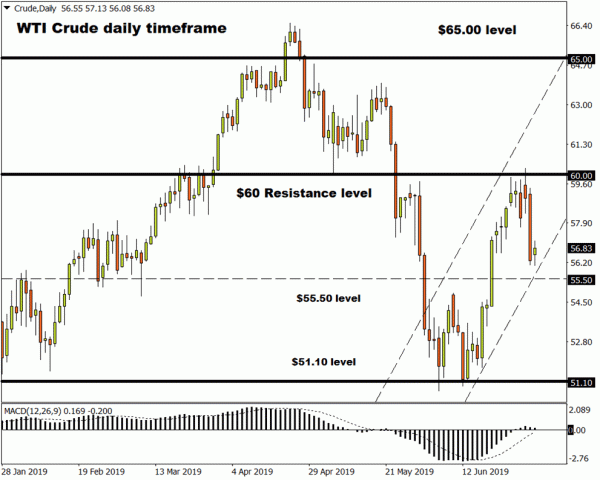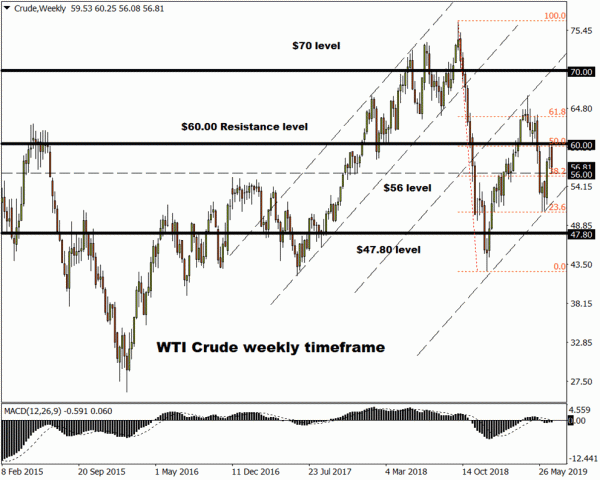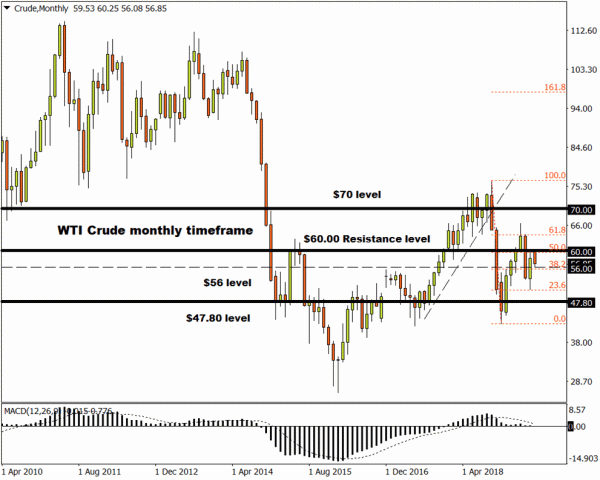In the third quarter, WTI crude is set to form a solid base to launch another attempt at the $65/bbl mark, providing the global demand outlook doesn’t deteriorate any further.
The downside for Oil appears to have been mitigated around the mid-$50/bbl range by the recent announcement of revived US-China trade talks, staving off the risk of an immediate deterioration in ties between the world’s two largest economies. Although the existing tariffs remain in place, the prospects of further levies being imposed has dwindled, at least for the time being. That ensures that the growth of global demand, while slowing, isn’t completely snuffed out.
Supply-side risks to remain manageable in Q3
On the supply side, the OPEC+ decision to maintain supply cuts at current levels until March 2020 should also set a stronger platform for Oil’s Q3 performance. Concerns about excess supplies flooding the market have been assuaged by a reported 163 percent compliance rate by OPEC+ members in May. With a goal in place to remove some 1.2 million barrels from global supplies in 2019, the tightened-for-longer Oil taps should ensure supply-side risks are managed.
Unexpected flare-up in geopolitical tensions could trigger fear-induced Oil spike
Simmering geopolitical tensions have also contributed to Oil’s rise as the current quarter begins. US sanctions on major producers have affected not just the physical delivery of crude, but also market sentiment. Oil market participants remain focused on US President Donald Trump’s Twitter activities, given his fervor for shaking up the global order while pre-empting his foreign policy moves with unexpected tweets. With market sentiment still fragile, any whiff of an escalation in geopolitical tensions could trigger a fear-induced spike in Oil prices.
Oil markets to remain cautiously optimistic in Q3
Still, investors might be remiss in believing that things are only looking up in the second half of the year. Developments surrounding US-China trade talks remain fluid, and recent history has shown that events can turn on a dime. Should negotiations between the world’s two largest economies hit yet another wall, the floor could give way beneath Oil. Also keep in mind that the existing tariffs already imposed by the US and China remain in place and have already dragged global growth lower. Additionally, should President Trump open up another front in US-led trade tensions, that will further darken the demand outlook for Oil.
US shale output could throw spanner into the works
Then there’s the surge in US shale output, which has been an unrelenting tide that threatens to drown attempts by OPEC+ to rebalance the markets. US supply has been on a record-chasing spree, having notched a new high for monthly output in April when it exceeded 12 million bpd, according to the US Energy Information Administration. Although the number of active rigs has dwindled as producers stateside appear to be shifting priorities towards profitability rather than output growth, their actions may not be enough to stop total US output from hitting 14 million bpd in 2020.
WTI crude expected to nudge higher in Q3
Such supply and demand risks could dampen the enthusiasm within the Oil markets for higher highs. Instead of leaping into the air, traders may just take measured moves in nudging prices higher. The key consideration for Oil in Q3 is how much resistance prices will face on the way up.
At the time of writing, WTI crude is trading below its 50- and 200-day moving averages. A break above those levels could be met with stiffer resistance at $61.92/bbl, while Oil’s immediate support line can be drawn at $52.28/bbl.



